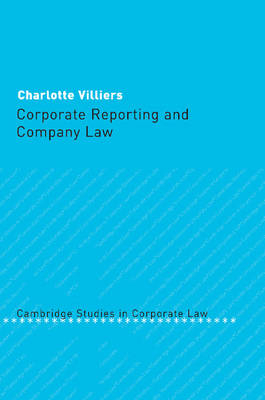
Corporate Reporting and Company Law
Seiten
2012
Cambridge University Press (Verlag)
978-1-107-40653-7 (ISBN)
Cambridge University Press (Verlag)
978-1-107-40653-7 (ISBN)
This book explores the main disclosure requirements of companies in their reporting activities, and seeks to bring together the main features of the reporting system. The book considers the theoretical basis of the corporate reporting system and describes the regulatory framework for that system.
The importance of disclosure as a regulatory device in company law is widely recognized. This book explores the disclosure requirements of companies in their reporting activities, and seeks to bring together the main features of the reporting system. The book considers the theoretical basis of the corporate reporting system and describes the regulatory framework for that system. It explores financial reporting and 'narrative' reporting, highlighting the fact that financial reporting requirements are more substantially developed than narrative reporting requirements - a consequence of the shareholder-centred vision that persists in company law. The roles of those responsible for providing corporate reports and those entitled to receive such information are examined. The book concludes with some broad suggestions for future development, with particular focus on the need to recognize the relevance of the communicative role of corporate reporting. The use of new technology also presents both challenges and opportunities for improving the regime.
The importance of disclosure as a regulatory device in company law is widely recognized. This book explores the disclosure requirements of companies in their reporting activities, and seeks to bring together the main features of the reporting system. The book considers the theoretical basis of the corporate reporting system and describes the regulatory framework for that system. It explores financial reporting and 'narrative' reporting, highlighting the fact that financial reporting requirements are more substantially developed than narrative reporting requirements - a consequence of the shareholder-centred vision that persists in company law. The roles of those responsible for providing corporate reports and those entitled to receive such information are examined. The book concludes with some broad suggestions for future development, with particular focus on the need to recognize the relevance of the communicative role of corporate reporting. The use of new technology also presents both challenges and opportunities for improving the regime.
Introduction; Part I. General Issues: 1. Disclosure theory and the limitations of corporate reports; 2. The regulatory framework; 3. Persons responsible for presenting corporate reports and information; 4. Users of corporate reports; 5. The Companies Register; Part II. Financial Reporting: 6. Financial reporting; 7. International aspects of financial reporting; 8. Disclosure in securities markets regulation; Part III. Narrative Reporting: 9. The Operating and Financial Review; 10. Social and environmental reporting; 11. Corporate reporting and employees; Part IV. A Way Forward: 12. Conclusions - rethinking the disclosure agenda.
| Erscheint lt. Verlag | 16.8.2012 |
|---|---|
| Reihe/Serie | Cambridge Studies in Corporate Law |
| Verlagsort | Cambridge |
| Sprache | englisch |
| Maße | 152 x 229 mm |
| Gewicht | 480 g |
| Themenwelt | Recht / Steuern ► EU / Internationales Recht |
| Recht / Steuern ► Wirtschaftsrecht ► Gesellschaftsrecht | |
| Wirtschaft ► Betriebswirtschaft / Management ► Unternehmensführung / Management | |
| ISBN-10 | 1-107-40653-6 / 1107406536 |
| ISBN-13 | 978-1-107-40653-7 / 9781107406537 |
| Zustand | Neuware |
| Haben Sie eine Frage zum Produkt? |
Mehr entdecken
aus dem Bereich
aus dem Bereich
Kommentar
Buch | Hardcover (2024)
C.H.Beck (Verlag)
219,00 €


